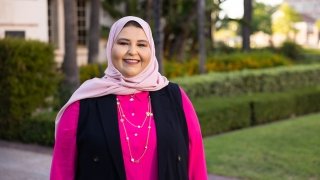Maha Al Romaihi has political ambitions and she isn’t coy about them. “I aspire to be Qatar’s minister of education,” says the 43-year-old international student, smiling confidently. Now in her third term in USC Rossier’s Global Executive Doctor of Education program, Al Romaihi sees the doctorate as an essential step.
As founding director of the Tariq Bin Zaid School (TBZ), she’s already a trailblazer. TBZ is a bilingual school run by the nonprofit Qatar Foundation with a mission to fuse a progressive International Baccalaureate (IB) curriculum with a culture deeply rooted in Qatari heritage.
Women like Al Romaihi—backed by Sheikha Moza bint Nasser, wife of the Father Emir and co-founder and chair of the Qatar Foundation—are leaders in Qatari education. The Qatar Foundation, a Doha-based nonprofit, operates 13 independent K–12 schools and runs dozens of other projects based in its centralized Education City, where eight world-class universities operate degree-granting satellite programs on a shared urban campus.
Qatar faces unusual educational challenges and opportunities. “We’re a population of 2.6 million people—almost all live in [Doha]—but only 330,000 are Qatari citizens,” explains Al Romaihi. Eighty-eight percent of students are noncitizens—the children of South Asian guest workers, expats and businesspeople from neighboring Middle Eastern and African countries, as well as from East Asia, Europe and North America.
Qataris appreciate Doha’s multicultural vibe, but they’re proud and protective of their language, heritage and Islamic traditions. “Huge changes are happening,” Al Romaihi says. “At the same time, we are very keen to keep to our roots.” In 2019, when Al Romaihi took the helm at TBZ, she was tasked with reimagining how it could adhere to the progressive IB framework while embracing Qatar’s distinctiveness. The key, she believes, lies in 50-50 bilingual education—half-English, half-Arabic. “The question is: How can we introduce a dual-language program that gives Arabic the status we want it to keep, while also learning English, which is the world language of business and economics and gets you so many opportunities?” she says. For her EdD thesis, Al Romaihi will look at models around the world and determine what best fits Qatar’s circumstances.
Al Romaihi loved the English language from a young age in Qatar and says her “English teacher was my idol.” Her parents spoke little English. Dad worked as a government clerk; Mom was an administrative assistant. Neither had an education beyond middle school. She grew up steeped in 1980s and ’90s American pop culture. “I know all of Madonna’s and Michael Jackson’s songs,” she says. Watching American TV shows like Beverly Hills, 90210 and The Fresh Prince of Bel-Air greatly improved her vocabulary.
After earning her bachelor’s in education from Qatar University, she became an English teacher. She got promoted to curriculum coordinator, then vice principal and principal. Along the way, she earned a master’s in educational leadership, also from Qatar University. Eleven years ago, she moved from Doha’s public school system to the Qatar Foundation’s network of independent schools.
She also raised two sons. Both are now students at Education City: Abdullah, 19, studies media and communication through Northwestern University in Doha, and Abdul Aziz, 18, begins his freshman year in Texas A&M University’s mechanical engineering satellite program.
For Al Romaihi, the decision to enroll in the Global EdD program was driven by curiosity about what works outside Qatar. The ability to study part time and continue as TBZ’s director was “the cherry on top.” Her husband, Soud, a retired police officer, is “very supportive,” she adds.
While the program’s trips to Los Angeles and Singapore were canceled in 2020, her cohort finally met in person in July, when they convened for their first eight-day residential session at USC. Al Romaihi can’t wait to explore more of the global education landscape with her classmates. Future intensives will take them to Helsinki, Johannesburg and São Paulo, Brazil, where they’ll interact with local education leaders and visit innovative lab schools.
“This is the beauty of the program and why, I think, most of us signed up,” she says. “Because we all love traveling, love to be in different cultures and want to get to know the educational scene of each country.”




